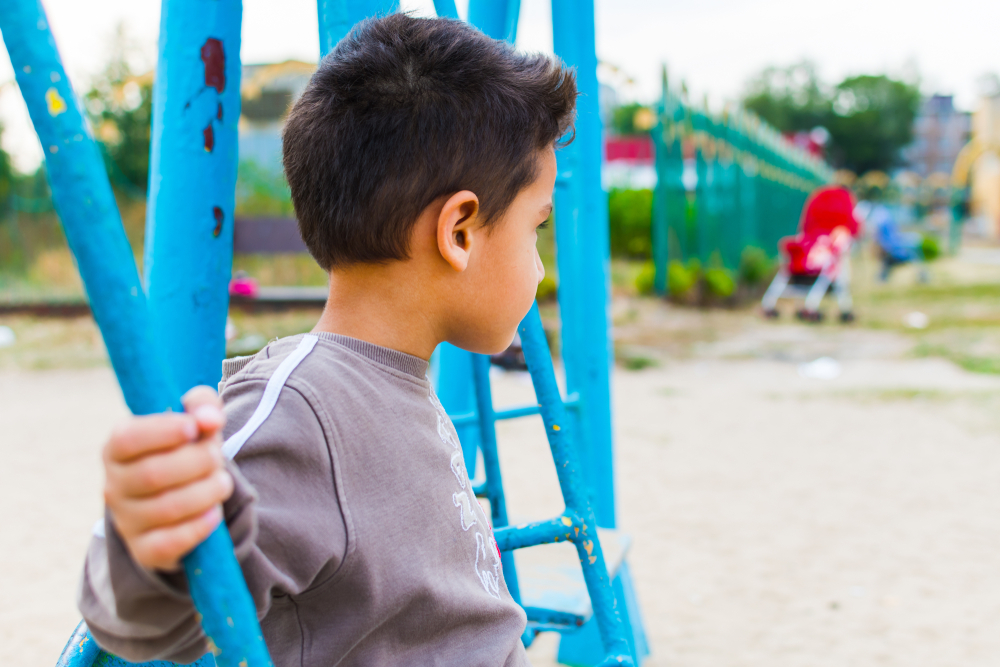People Raised Without Affection Often Develop These Surprising Traits, Psychologists Say

A seed deprived of sunlight doesn’t quit it stretches, pale and wiry, straining for warmth that never comes. Many of us were those seeds. Perhaps “I love you” was an echo you chased, or a hug felt as rare as a solar eclipse. Years pass, résumés lengthen, friendships form, yet beneath the surface the roots still thirst for light.
Here’s the twist: a 30-year Duke University study found that babies who received “extravagant” maternal affection grew into adults far less prone to anxiety and stress yet fewer than one in ten infants in the study felt that level of warmth. The rest learned to survive in emotional twilight, crafting quiet super-skills like relentless perfectionism, people-pleasing, or ironclad independence—impressive on paper, exhausting in the marrow.
Why does praise make your shoulders stiffen? Why does the word “enough” feel slippery no matter how hard you grip it? The answers trace back to those early fractures between need and nurture fault lines that can be mended once we see them clearly.
How Lack of Affection Shapes Us
When affection is absent in a child’s life, it doesn’t simply leave a gap it carves a blueprint. From the way we talk to ourselves to how we trust (or don’t trust) others, early emotional neglect seeps into the foundation of who we become. And the most haunting part? Many adults don’t even realize that their struggles today stem from what they never received decades ago.
Dr. Caitlin Slavens, a registered psychologist, explains that affection isn’t just a “nice-to-have” in childhood—it’s the emotional scaffolding that teaches us how to love, trust, and self-soothe. When that scaffolding is missing, the child often internalizes a dangerous message: Love is conditional, and I must earn it. Over time, this belief quietly manifests into patterns that feel like personality traits but are, in fact, survival strategies.

Some children adapt by becoming overachievers constantly striving to win praise, fill silence, or justify their worth. Others become people-pleasers, prioritizing everyone else’s needs over their own, desperate for the affection they were denied. Beneath these behaviors lies a powerful fear: that if they stop performing, they’ll stop being loved.
Then there are those who go the opposite direction developing emotional walls so thick, they become hyper-independent or even emotionally numb. They tell themselves they don’t need anyone. They pride themselves on never asking for help. But deep down, it’s not confidence it’s self-preservation.
Psychologist Dr. Brittany McGeehan notes that many of her clients, especially those who never heard “I love you” growing up, struggle with a fractured sense of identity. They’re not sure who they are, what they feel, or what they need because no one ever mirrored those things for them in childhood. In some cases, they unconsciously become chameleons in relationships, morphing into who they believe others want them to be, all to avoid the sting of rejection or abandonment.
How Emotional Neglect Manifests in Adulthood

Emotional neglect doesn’t always scream it whispers. It shows up subtly, disguised as everyday habits, personality quirks, or relationship struggles. But behind the surface of these behaviors is a history of unmet needs, often buried deep beneath layers of self-reliance, perfectionism, and fear.
Psychologists like Dr. Thea Gallagher and Dr. Caitlin Slavens have observed recurring traits in adults who lacked affection in childhood. These patterns don’t define someone’s worth, but they do reveal how childhood silence can echo through a lifetime.
1. People-Pleasing and Perfectionism
Many adults who grew up without consistent emotional affirmation become hyper-focused on being “good enough.” They say yes when they mean no. They avoid conflict at all costs. They overextend themselves, hoping that if they’re useful, they’ll be lovable. Dr. Brandy Smith notes this behavior stems from a belief that love must be earned and that pleasing others is the safest currency.
Similarly, perfectionism isn’t always about high standards. Often, it’s about fear. Fear of being seen as flawed. Fear of not being worthy unless everything is flawless. Dr. Dakari Quimby explains that these adults were conditioned to believe love comes with strings attached so they spend their lives tying knots that will never feel tight enough.
2. Emotional Distance and Fear of Vulnerability
When children grow up in homes where love is withheld, vulnerability feels dangerous. These individuals often learn to keep emotions locked away, fearing that if they open up, they’ll be rejected or worse, ignored. As adults, this can show up as difficulty expressing affection, discomfort with intimacy, or even an inability to trust compliments or kind gestures. Dr. Brittany McGeehan describes it as emotional withdrawal: a learned detachment that was once protective but now isolates.

3. Difficulty Knowing or Naming Emotions
Children learn to understand and regulate emotions through attuned caregivers. When affection is missing, so is that emotional blueprint. As adults, many struggle to even identify what they’re feeling, let alone express it. This internal fog can lead to mood swings, chronic irritability, or emotional shutdowns. It’s not that these individuals are cold it’s that they were never taught how to safely feel.
4. Fear of Abandonment and Rejection
Without early experiences of unconditional love, many carry an internal belief that they’re inherently unlovable. This makes relationships feel unstable even terrifying. Some cling tightly, fearing abandonment; others push people away to avoid being left first. Both behaviors stem from the same wound: the belief that love is fleeting, and they are easy to leave.
5. Chronic Loneliness and Hyper-Independence
Perhaps one of the most paradoxical outcomes is the coexistence of loneliness and self-isolation. Adults who didn’t receive affection may convince themselves they don’t need anyone. They become fiercely independent not out of strength, but out of fear. Yet beneath that armor is often a deep longing for connection, one they may struggle to acknowledge or pursue.
These traits aren’t flaws they’re adaptations. They were developed in environments where affection was scarce, inconsistent, or unsafe. Recognizing them is not about judgment; it’s about compassion. Once we understand how these behaviors took root, we gain the power to unlearn them and plant something healthier in their place.
The Research Behind the Patterns

We often think of love and affection as emotional or even spiritual needs but science tells us they are biological ones too. The effects of early affection, or its absence, don’t just live in our memories. They shape our brain chemistry, nervous system, and even our ability to regulate stress. Emotional neglect isn’t just a feeling it’s a measurable disruption in human development.
The Science of Warmth
In a landmark 2010 study by Duke University Medical School, researchers followed nearly 500 individuals from infancy into their 30s. When these participants were just eight months old, psychologists observed their mothers’ levels of affection ranging from cold and detached to “extravagant” warmth. Three decades later, the children who received the highest levels of affection were significantly less likely to suffer from anxiety, social disconnection, or psychosomatic symptoms. They were, quite simply, happier and more resilient.
What accounts for this? One answer is oxytocin, often called the “love hormone.” It’s released through physical touch, eye contact, and emotional bonding. Oxytocin helps children feel safe, connected, and supported. According to the researchers, nurturing environments seem to “program” the brain to produce and respond to oxytocin more efficiently. This translates into greater emotional stability, trust in others, and a stronger ability to cope with stress.
But when that affection is absent, the effects can be just as profound only in the opposite direction.

The Toll of Emotional Deprivation
Research from UCLA (2013) found that children raised without unconditional love show greater activity in parts of the brain associated with fear and anxiety. Over time, this can lead to chronic stress and heightened sensitivity to rejection. Their brains literally adapt to expect disappointment and emotional danger.
Another study from the University of Notre Dame (2015) surveyed more than 600 adults and found that those who had received frequent physical affection as children were more compassionate and emotionally stable. Those who hadn’t were more prone to depression, anxiety, and difficulty connecting with others.
The effects aren’t just psychological they’re physiological. Children raised in emotionally deprived environments, such as orphanages, often have elevated levels of cortisol, the stress hormone. High cortisol levels over time have been linked to everything from immune dysfunction to impaired memory and increased risk of chronic illness.
Even small gestures like regular hugging or soothing touch can have powerful effects on brain development. According to Child Trends, a nonprofit research organization, parental warmth is associated with everything from better academic performance to healthier social skills. Meanwhile, its absence is linked to alienation, hostility, and lower self-esteem.
Breaking the Cycle: Healing Starts Within

The past may have shaped you but it doesn’t have to define you. One of the most powerful truths to realize as an adult is this: what you didn’t receive, you can learn to give. Healing from a childhood without affection doesn’t mean pretending the pain didn’t happen. It means choosing, day by day, to treat yourself with the tenderness you were once denied.
Dr. Caitlin Slavens calls this process “reparenting yourself” stepping into the role of the loving, present caregiver you never had. This isn’t about blame; it’s about responsibility. It’s about asking: How can I offer myself the love I was once waiting for?
1. Practice Radical Self-Compassion
The inner critic often speaks the loudest in those who grew up without affection. To begin healing, you must learn to challenge that voice and speak to yourself with kindness. Dr. Thea Gallagher recommends asking: Would I say this to a friend or a child? If not, you don’t say it to yourself.
Simple acts of self-love matter. Rest when you’re tired. Comfort yourself when you’re hurting. Praise yourself not only when you succeed, but when you try. These small, repeated gestures begin to rewire your self-worth.
2. Identify and Honor Your Emotions
Many who were emotionally neglected never learned how to name what they feel. Dr. Slavens suggests checking in with yourself daily: What am I feeling? Where is it in my body? What might it be trying to tell me?
This emotional fluency is a critical step in developing boundaries, expressing needs, and forming authentic relationships. You are allowed to feel. You are allowed to take up emotional space.
3. Set Boundaries Without Guilt
When love was conditional growing up, saying “no” can feel terrifying. But boundaries are not walls—they are clarity. They are how we teach others (and ourselves) what respect looks like. Practice setting small boundaries and sticking to them. You don’t need to over-explain or apologize for protecting your peace.
4. Build Safe, Supportive Relationships
Healing doesn’t happen in isolation. Surround yourself with people who see you, hear you, and love you without conditions. Dr. Brittany McGeehan emphasizes the importance of having “mirrors”—people who reflect back the worth and value you may have forgotten. Sometimes this support looks like close friends. Sometimes it looks like a skilled therapist.
Speaking with a mental health professional can be transformative, especially if you’re uncovering deep wounds for the first time. Therapy offers a safe space to process your pain, reframe beliefs, and practice being vulnerable without fear of rejection.
5. Celebrate Small Wins
You don’t have to wait for a big breakthrough to celebrate yourself. Did you say “no” today? Speak your truth? Rest instead of push? That’s healing. That’s growth. Dr. Slavens recommends intentionally acknowledging these moments. They reinforce a new internal narrative—one where you are worthy, lovable, and enough.
The Healing Starts With You
You may not remember the moment you learned to stop expecting love but your body remembers. Your nervous system remembers. That quiet ache, that constant over-effort, that fear of being “too much” or “not enough” they didn’t come from nowhere. They came from a time when love was uncertain, inconsistent, or altogether absent.
But here’s the truth your inner child still hopes you’ll believe: you are not too late for love.
The beauty of being human is that we are not cement we are clay. We bend, we adapt, and we can be reshaped. You can unlearn the belief that you’re unlovable. You can rewire the fear that you’ll always be alone. You can show up for yourself in the way no one once did.
Every kind word you say to yourself… every boundary you set… every moment you choose rest over hustle, truth over performance that’s you stepping into the light your younger self never knew.
You may have been raised without affection.
But now, you get to raise yourself with it.
And as you do, you’re not just healing the past you’re creating a future. A future where love isn’t earned through perfection, but given freely. Where vulnerability is not weakness, but proof that you’re alive, growing, and still becoming.
So take a breath. Put your hand on your heart. Speak gently to yourself.
Begin again not because you are broken, but because you are ready.
Loading...

